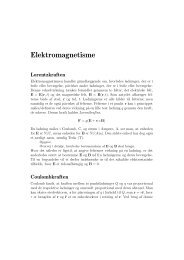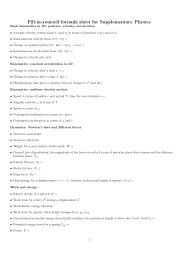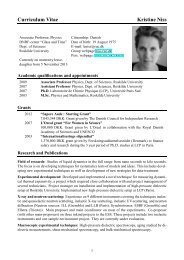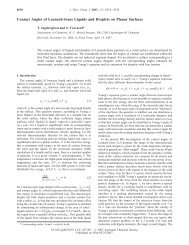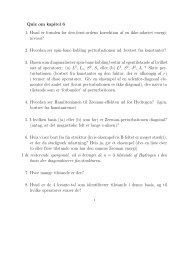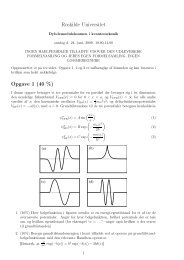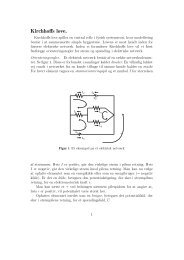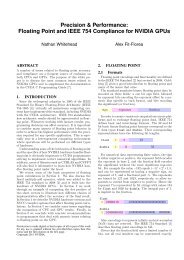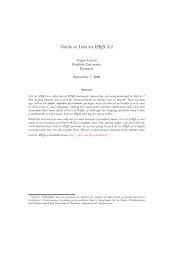Ph.D. thesis (pdf) - dirac
Ph.D. thesis (pdf) - dirac
Ph.D. thesis (pdf) - dirac
Create successful ePaper yourself
Turn your PDF publications into a flip-book with our unique Google optimized e-Paper software.
156 Boson Peak<br />
meaning that the Debye level essentially is given by<br />
rDOS D (ω) ∝ 1<br />
ρvt<br />
3 . (8.2.6)<br />
In a Debye situation the hardening of the system (increase of elastic constants)<br />
pushes the Debye density of states. The Debye level gets lower and the cut-off<br />
frequency gets higher, while the total number of states of course stays constant.<br />
The intensity of rDOS will therefore naturally get lower, due to the decrease of the<br />
Debye level.<br />
1<br />
Relative intensity<br />
0.8<br />
0.6<br />
0.4<br />
0.2<br />
BP intensity<br />
ω D<br />
−3<br />
0<br />
0 500 1000 1500<br />
Pressure [MPa]<br />
Figure 8.8: The Debye level (•) and the boson peak intensity () as a function of<br />
pressure.<br />
In figure 8.8 we illustrate the decrease in the Debye level as a function of pressure.<br />
We compare this decrease to the decrease in the boson peak intensity. It is seen that<br />
the amplitude of the boson peak decreases less than the Debye level. Consequently<br />
we conclude that the boson peak intensity relative to the Debye level increases as a<br />
function of pressure. The analysis of the boson peak intensity relative to the Debye<br />
level was also performed in the study of densified glasses by Monaco et al. [2006 b]<br />
and in an earlier study by the same group on a hyper-quenched glass [Monaco et al.,<br />
2006 a]. The finding in these studies was that boson peak intensity relative to the<br />
Debye level was unchanged. The difference between their conclusion and our finding<br />
could (as for the peak position discussed above) be due to the much larger change<br />
of density in the present study. Alternatively it is quite possible that the behavior is<br />
not universal but will depend on specific properties of the glass. Thirdly it is worth



